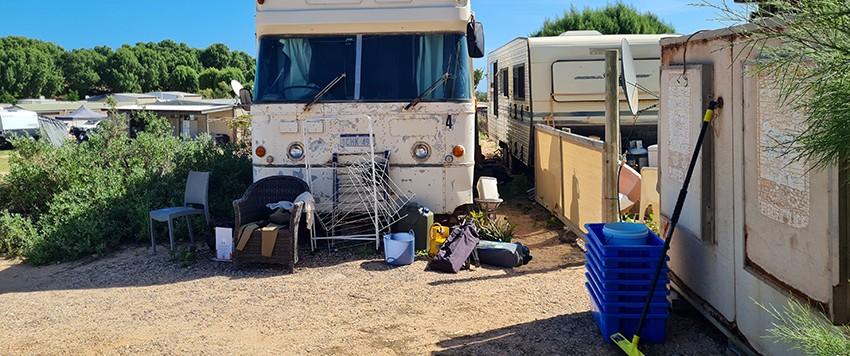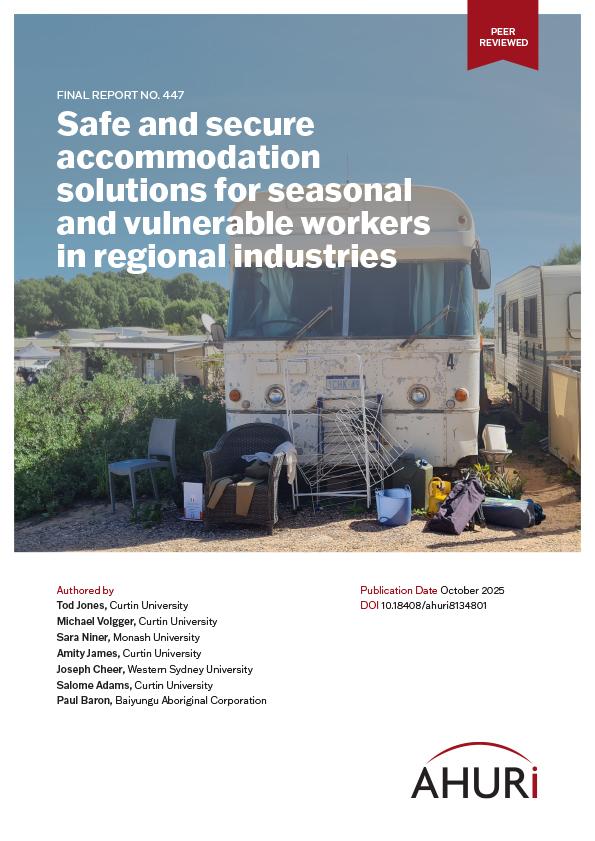
Poor accommodation a major challenge for regional workers and industries
02 Oct 2025
New AHURI research has investigated how seasonal and vulnerable migrant workers, who are vital to regional economies, can access better housing in regional Australia to ensure a healthy, safe and productive workforce.
Regional Australian industries have a high demand for both skilled and unskilled migrants.
However, migrants working in regional Australia regularly experience poor quality, inappropriate and crowded accommodation.
This can be exacerbated by visa conditions, such as Pacific Australia Labour Mobility scheme (PALM) workers who cannot change employer and generally live in employer-provided accommodation.
Changes in Australian housing markets have increased the cost and reduced the availability of accommodation in many region locations.
Appropriate accommodation is important for regional workers’ wellbeing and for them to establish good relations with regional communities and employers.
Seasonal and vulnerable workers provide temporary and inexpensive labour
Associate Professor Tod Jones from Curtin University said seasonal workers were a diverse mix of Australian and migrant workers whose time working in regional areas ranged from as short as three months, to as long as four years.
“There are two significant factors affecting these workers,” Associate Professor Jones said.
“The first is whether they stay for a short period or semi-permanently; the second is the type of visa they hold. Visa rules differ greatly between the PALM scheme and Working Holiday Maker scheme.”
As a requirement of their visa, PALM workers must remain with the same employer in the same location and can work in Australia for up to four years.
Working Holiday Maker scheme workers can work for three to six months in a regional location as a condition to extend their visa.
Employer provided housing is often the poorest quality
Accommodation for seasonal and vulnerable workers in regional industries too often is inadequate, and at times financially exploitative.
In many cases seasonal workers rely on temporary and informal housing, including shipping containers, caravans and portable buildings. Even in permanent housing, temporary measures such as bunk beds, sharing rooms and shared facilities are common.
According to the study findings, seasonal workers in employer-provided accommodation can face a higher risk of having to live in poor-quality housing. However, they are less likely to raise concerns, due to:
- lack of housing choice
- need for ongoing employment and dependence on employers
- lack of knowledge about housing standards and how to raise complaints.
These housing conditions can have negative effects on workers’ health, particularly when there is no private space and workers stay for extended periods.
Options to deliver better housing
Monash University’s Dr Sara Niner said the workers addressed in the study were some of the most vulnerable to exploitation in Australia.
“There is an opportunity for reform to enable to PALM workers to change employers once initial costs have been paid off and systems to ensure regular independent accommodation inspections,” Dr Niner said.
“In addition, seasonal and vulnerable workers should have improved access to information about housing standards and how to contact advocates who can assist them to have issues addressed.”
Building a supply of new regional worker accommodation will require innovative public-private partnerships with a focus on long-term solutions. Such accommodation should be available to workers from a number of different employers.
Professor Michael Volgger from Curtin University said there was scope for policymakers to address the situation.
“State and local planning laws could encourage investment through designating land for worker accommodation, or requiring major regional development projects and strategies to address questions around worker accommodation more explicitly,” Professor Volgger said.
The research was undertaken for AHURI by researchers from Curtin University, Monash University, Western Sydney University and the Baiyungu Aboriginal Corporation.

